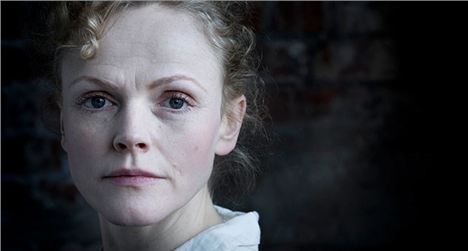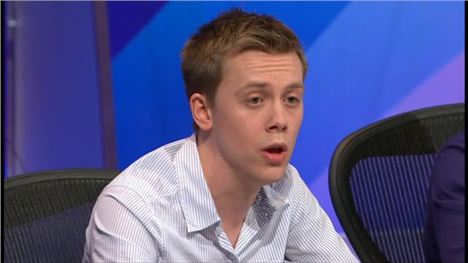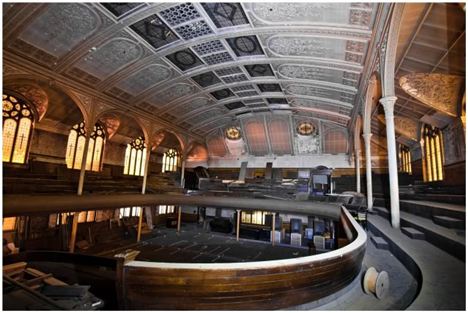THE Peterloo Massacre and its consequences are one of the themes of this year’s Manchester International Festival.
And rightly so.
In a straw poll on the question, ‘Can large groups of people working together change things?’ 3% of the Albert Hall audience say no and 95% say yes.
England, and Manchester in particular, set international standards for the advance of enfranchisement and democracy. This weekend will see Maxine Peake perform in The Masque of Anarchy, Percy Bysshe Shelley’s response to the massacre at Peterloo, while last weekend economist, journalist and BBC broadcaster Evan Davis (Dragons’ Den) chaired a debate entitled ‘Are We Powerless?’
 Maxine Peake performs in Shelley's The Masque of Anarchy
Maxine Peake performs in Shelley's The Masque of Anarchy
Appropriately both of these events take place in the newly reopened Albert Hall on Peter Street, right on the edge of the St Peter’s Fields site where in 1819 a gathering of 60,000 Mancunians assembled to hear Henry ‘Orator’ Hunt speak in a claim for wider political representation. The authorities panicked, sent in armed personnel on horseback and nineteen people died. Hundreds more were injured.
Evan Davis wants to know whether the many still have power. Shelley’s poem ends:
Rise like Lions after slumber
In unvanquishable number,
Shake your chains to earth like dew
Which in sleep had fallen on you-
Ye are many, they are few.
Does the economic power in the hands of the few make it impossible for the many to effect real change? In a straw poll on the question, ‘Can large groups of people working together change things?’ 3% of the Albert Hall audience say no and 95% say yes (and the other 2%?). Perhaps that’s a Manchester response.
I’d have liked to have heard more from Evan Davis, even if he does profess, as a BBC presenter, to possess a total absence of opinion.
Well there’s still a panel of five to hear. Firstly Owen Jones, something of a circuit darling among lefties for his book Chavs: The Demonisation of the Working Class. His standard analysis is that power will concede nothing without a demand, and that social change requires anger at how things are and hope about how things could be.
The latter is often absent and the power elites refocus our anger by a divide and rule approach so that our anger regarding the current situation is diverted to a small but exaggerated number of easy targets such as ‘benefit scroungers’.
In true circuit darling style Owen Jones has to leave before the end to head for another engagement. I’m always slightly suspicious of those who do this; it seems like a controlling mechanism to avoid the informality and unexpected questioning at the end of a debate. He does speak well though.
I wonder if Sam Bamford took this approach. I prefer to think of the Middletonian campaigner and his cohorts discussing the campaign for democracy over beers in the Ring‘O’Bells.
Dr Judith Shapiro, an academic specialising in Eastern European transition to market economies argues that you need more than anger and hope: you need to know what you are for.
Ishmael Ertürk, a former Istanbul merchant banker, now researching and teaching at Manchester Business School and specialising in financialisation and financial innovation questions the authority and legitimacy of those assessing financial risk: aren’t they the same people who risk-assessed prior to our current difficulties?
Both academics possess extensive detailed knowledge but also the skills to speak to a non-specialist audience.
Louise Cooper is there to argue for capitalism. She does this by praising the National Health Service and Britain’s ability to encourage ordinary children to attend university, even children like her, whose mothers can recall ice inside the window in their childhood years.
As a justification for capitalism this rather perplexes the Manchester audience, many of whom don’t have to go too far back to remember icing on the inside of the windows.
It’s the wealth that capitalism creates, Cooper argues, which allows us health and education for all. The many in the audience and the few on the platform, mainly Owen Jones, remind her that this provision was not a gift freely bestowed, but were hard fought rights.
Louise Cooper also blames the regulators, the authorities and the government for the financial misdealings. They are still very much ‘like children’, happy to take the financial institutions’ taxes to pay for education and health, but unable to effectively discipline these giants.
Adam Curtis, documentary-maker, MIF favourite (It Felt Like a Kiss) and Massive Attack-collaborator, is surprised at being asked to give a five minute speech. He finds Economics boring, ‘unstoryfiable’, questions our belief in only the negative self-interested aspect of human nature and believes that our vision of what an alternative future could be might need to question the unassailable position of individual freedom as our ultimate value.
We are stronger together. Is individual freedom sometimes a constraint? We lose something when we are encouraged to look too much into ourselves. His contribution strengthens during the question session and his final remarks gain considerable applause.
Despite a superb setting and a strong panel the debate is less than the sum of its parts. More from Evan Davis would have been appreciated; his ability to make Economics lucid without oversimplifying might have altered Adam Curtis’ view of the discipline. He has strengths as a chair, able to frame incisive questions to panel members, but should have challenged the very common failure to distinguish between economics and finance.
The occasion demanded a completely democratic approach to audience questions, but I think I might prefer the quality control methods of Question Time in focusing the direction of the discussion.
Ultimately the panel was too large and diverse for a clear discussion within the time frame. The audience disappeared. The event was over. Was this a debate or was this entertainment? Was it a combination of the two?
The setting however, is magnificent. The Albert Hall, will soon close for Joel ‘Trof’ Wilkinson’s (rare interview here) refurbishments to be completed. It will be reopened as a multi-use venue next year.
In the meantime MIF presents further opportunities to visit this impressive venue with The Masque of Anarchy from 12 – 14 July, Goldfrapp 17 – 18 July and Mogwai on the 19 – 20 July.
All information and tickets for MIF events can be found here.
















